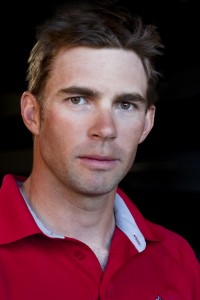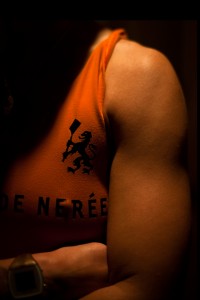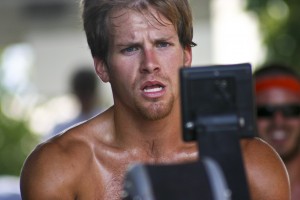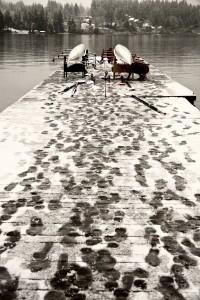Shedding Light on Kevin Light
March 16, 2011
In Kevin’s words:
Shedding Light on Kevin Light

By Yasemin Watkins
Kevin Light is a three-time World Champion and a member of the 2008 Olympic Gold medal-winning Men’s 8+ crew from Canada. Light is currently training with Mike Spracklen in Victoria, BC for a chance to race in the 2012 Olympics in London, England (Light’s third Olympic games).
I spoke to Light recently and asked him to comment on three of his favorite photographs, as well as three of the greatest challenges of elite-level training: injuries, sacrifice, and finding balance.
In Kevin’s words. Here is what he had to say.
On photography
“(When I was young) I used to collect Olympic Coke Bottles. I thought one day, I want to compete in an event that’s on a Coke bottle.
I collect things that capture the emotion of a scene or moment. Photography captures the moment. I like the idea of capturing moments that will never come again, though it doesn’t have to be a photo.”
Lindsay Jennerich

Photo: Kevin Light
Taking photos of Lindsay is fun.
I’m around guys all the time, and having her around offers a different subject. Lindsay has trained with Mike Spracklen’s group for quite a few years now, until she left for London, Ontario, where she partnered with Tracy Cameron and won the women’s lightweight double at the World Championships in New Zealand.
This photo was taken after an erg workout. Some of the lights were off and I asked her to stand under one of the overhead pot lights. (I’m getting better at asking people to pose when I see an interesting photo opportunity.) She laughed when I pointed the camera right at her chest, but the light on her arm and the orange suit contrasting with the dark shadows looked cool. When I was editing the photo later that night, I noticed her nipple was showing through her unisuit. At first, I thought it ruined the photo because it can be embarrassing or awkward for the subject, and I didn’t want her to feel this way.
The more I looked at the photo, however, the more I liked it. I think it has a strong athletic message. It shows an arm that is strong enough to be either a man’s or a woman’s. Since her face is not visible, her nipple is the only way to identify her as a female.
Throughout my rowing career, I’ve always cared more about my performance than my appearance. This photo reinforces that message because in a room full of 20 men, Lindsay pulls on her erg concentrating only on her performance, not about what she looks like. To me, this differentiates an athlete from somebody who works out at the gym for fitness.
When I look at this photo, I see Lindsay saying, “This is my body. This is who I am.” I think this message is inspiring, especially to young women with athletic aspirations.
I’m proud of my body because it is who I am.
Robert Weitemeyer

Photo: Kevin Light
At this point in my photography career (2005), I was not thinking about making photographs. I was just pointing the camera at people.
I have no idea what the settings — lens, aperture, shutter speed — on the camera were. The camera was on full automatic mode. This photo represents a time when I didn’t understand exactly what I was doing. Though I still have a lot to learn, I’m further along in that process now than I was six years ago.
During this period we didn’t have enough ergs, so there were two erg groups. One at 3pm and one at 4pm. Rob was in the 3pm group. The framing is good with the screen in the foreground and his eyes looking at it. Rowers can relate to how he is feeling.
Rowing is such a serene and almost spiritual sport. On the water, the oar can be manipulated, producing the feeling of gliding along flat water. That feeling is a stark contrast with the other way rowers train, which is probably the least spiritual of all the ways to exercise. You expend so much energy trying to get a number on a screen to drop by one. And at the end of all that effort, you get off in the exact same place that you started.
It’s like climbing a mountain knowing there is no view at the top.
Footsteps in the snow

Photo: Kevin Light
This is one of the most popular photos I have ever taken.
The footprints are interesting. But it wasn’t until later that I had realized that the photograph had an external message — similar to Lindsay’s photograph. It’s probably the most accurate description of what it’s like to row in an eight: it doesn’t matter who you are, you have to know your role, and be willing to fill it. If that happens, you and your teammates have the potential to create something very cool. The photo is a metaphor of how rowers work together to create something that lasts forever. It’s one of my favorites and hangs in my house with the signatures of all the men from our 2008 Olmypics team.
I’m always looking for my next big photo. This one makes me think of how a rock band must feel when they do concerts. Their fans only want to hear the hits, while the band wants to play their newer, less popular music. They are proud of their old songs as I am with this photo, but I’ve talked about it and seen it so many times that it’s lost some of its excitement for me. That said, I’m really glad I had my camera that day to take this photo.
Injuries
I used to think that injuries were a part of sport. If you weren’t getting injured, then you probably weren’t pushing yourself to the maximum of your potential.
Now that I’m older and I little wiser, I still believe that, but there are a few amendments. If you’re irresponsible and don’t take actions to treat the small injuries and let them become bigger ones, then that’s your own fault. And that can happen with an easy training program. Also, blaming anyone else for your injuries won’t help.
When you do get injured, your role changes from rower to personal self-healer. I have been injured quite a bit. When I had vertigo in 2006, I learned that when you’re well, you should always do your very best. When you’re injured, you want to do anything to get back on the water. You get so bored of sitting around and visiting the doctors. You just want to row. Then other times, when you’re not injured, you don’t take full advantage of your healthy body. You shortchange yourself by not pushing to your full potential. Thoughts like, “I feel tired today I won’t go full pressure on the erg,” or “I only want to row 5km instead of 10km this afternoon.”
When you’re not injured, remember how much you wanted to row when you were injured.
Also, I believe that if you pull out of a workout because of an injury, you shouldn’t return to the workout the next day. If you rush back, you risk aggravating your injury. If you’re sick (which is kind of like an injury), I think it’s always better to wait an extra day before you come back. Your body gets used to a certain type of load. When you’re injured, you’re not stressing your body the same way and it adjusts to that lack of training volume. When you reintroduce your body to that volume, make sure that it is ready. If it’s not, you’ll be dealing with the side effects of increased fatigue and the repercussions of a nagging injury at the same time.
Also, if you’re injured, limit the times your teammates see you leave early from a workout. It’s better to go into the dock early once and not be seen for 10 days, than it is to be seen going into the dock early 10 consecutive times after trying to row with an injury.
Sacrifice.
It really depends how you think about sacrifice. I know more training will give me a better chance to win. And winning is what I want to do.
Over the past 10 years, I have sacrificed many things an average person would not. But I’m not interested in being an average person. When I say “sacrificing” I mean missing out on normal things — things I would like to do that require no specific skill but are enjoyable. Things like watching an NHL hockey or a football game, or going out on a Friday or Saturday night. I don’t believe that I have sacrificed that much for all the rewards I’ve been given.
I love exercise and I get to exercise everyday day and get paid for it. Not very much, but I still get paid. I will be starting my career as a photographer at 33, when normally I would have started a lot earlier. But at the same time, I will be changing careers at 33 having absolutely loved how I spent the last 15 years of my life. I probably would have had a job and kids by now had I not been rowing, and I guess that is a bit of a sacrifice. But I can still do those things.
I believe that there are more people who are envious of my life and the things that I have accomplished, than I am of theirs. But then again not everyone likes sports, so that statement may be a little bit presumptuous. Some days, I still can’t believe that I won a gold medal at the Olympics. Learning what it takes to win has provided me with so many skills and opportunities that I can hardly say that the last 14 years of my life have been a sacrifice. It would only be a sacrifice if I didn’t give 100% effort each day.
If I spent the last 15 years rowing and never won anything, then I would say it would have been a huge sacrifice and a waste of time. I’m so scared of being average, and I’m not average in some of the things I do and collect. But I’m proud of who I am and the things I have done.
Finding Balance.
People say how important it is to have balance.
They tell me how lucky I am to have photography and videography as something that can distract me from rowing. The only thing is that 90% of my photos and pretty much all my video work is about rowing. So it’s not as much a distraction as you may think. I can see how having something else to occupy your time can be useful. The only problem is that I’m usually so tired, that I don’t have the extra brain power to get much accomplished.
What I have discovered over the last few months is that the less I do (because I’m tired), the more tired I feel. So lately I’ve been trying to set at least one goal. Clean my room, empty the dishwater or whatever. Just something small that does not require much effort, but makes me feel like I’ve actually accomplished something. I feel less like a bum, and therefore less tired. The more tired you think you are, the more tired you will become.
I need my rest between workouts. But feeling bad about myself for not accomplishing anything can also lead to low self-confidence in other areas of my life, especially on the water. Finding balance in that way is also important. I never feel worse than sitting in front of the TV watching reruns of ‘Two and a Half Men’. That makes me feel fat and stupid. I started watching more TV shows where I actually learn something.
Surprisingly, getting up after watching informative TV, I feel more educated and that helps me recover and stay fresh for the next day of rowing.
To See More of Kevin Light Photo’s Click Here
Comments
Got something to say?
